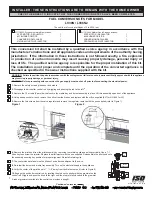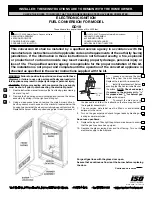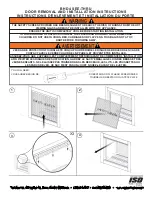
78D2082
15
WDV See-thru Gas Fireplace
A
B
10’
FP2749
Horizontal run
reduction
VenTInG InSTallaTIOn
VerTIcal/hOrIZOnTal TerMInaTIOn
cOnFIGuraTIOnS
Since it is very important that the venting system main-
tain its balance between the combustion air intake and
the flue gas exhaust, certain limitations as to vent con-
figurations apply and must be strictly adhered to.
The Vent Graph, showing the relationship between vertical
and horizontal side wall venting, will help to determine the
various dimensions allowable.
Figure 10
nOTe:
Horizontal and vertical sections of this vent system
require a minimum of 1" clearance to combustibles at the
top, sides and bottom.
When vent exits through foundations less than 20" (508
mm) below outcrop, the termination must be flush up with
outcropped wall above.
It is best to locate the fireplace in such a way that minimizes
the number of offsets and horizontal vent length.
The horizontal vent run refers to the total length of vent
pipe from the flue collar of the fireplace (or the top of the
Transition Elbow) to the face of the finished outside wall.
•
The maximum number of 90° elbows per side wall
installation is three (3).
Figure 14
•
A minimum of 12" (305 mm) is required before a 90°
elbow. If a 90° elbow is fitted directly after 12" (305 mm)
vertical section mounted to the top of the fireplace, the
maximum horizontal vent run before the termination or
a vertical rise is 36” (914 mm).
Figure 15
Figure 14 -
Maximum Three (3) 90° Elbows Per Installation
3 x 90°
Elbows
12"
(305 mm)
Min.
FP1380
In
Figures 16 and 17
dimension A plus B must not be
greater than 17' (5.2 m).
•
For each 45° elbow installed in the horizontal run, the
length of the horizontal run MUST be reduced by 18" (45
cm). This does not apply if the 45° elbows are installed
on the vertical part of the vent system.
•
The maximum number of elbow degrees in a system is
270°.
Figure 17
Figure 15 -
Maximum Horizontal Run with No Rise
FP1381
•
If a 90° elbow is used in the horizontal vent run (level
height maintained) the horizontal vent length is reduced
by 36" (914 mm).
Figures 16 and 17.
This does not
apply if the 90° elbows are used to increase or redirect
a vertical rise.
example:
According to the vent graph (Page 13) the maxi-
mum horizontal vent length in a system with a 10' vertical
rise is 17
Z\x
’ (5.3 m) and if a 90° elbow is required in the
horizontal vent it must be reduced to 14
Z\x
' (4.4 m).
Figure 16 -
Horizontal Run Reduction
FP2749
Max. 20"
(508mm)
Max. 36"
(914mm)
90° Elbow = 36" (914
mm) Reduction
12" Min.
















































